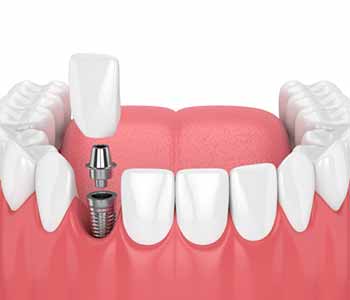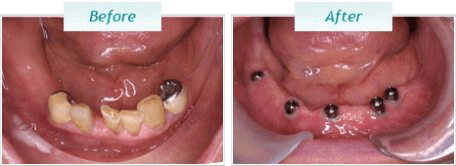Learn effective dental implant care from your San Francisco dentist

The routine care of implants is quite similar to the daily care of natural teeth. It is vital to keep implants clean and free of plaque by brushing two times a day and flossing daily. Cleaning implants are particularly essential after meals. This is achieved by brushing gently and paying special attention to cleaning all sides of the implant. During the consultation, the dentist will provide guidelines for dental implant care in San Francisco.
Aids for oral hygiene as part of your dental implant care may include:
- Soft, small, electric or manual toothbrush
- Tartar-control toothpaste
- Dental floss to clean around the implant
The dentist may also recommend:
- Inter-dental brushes or other oral aids to remove plaque between the teeth or on both sides of the implant
- Antimicrobial mouth rinses
You must be dedicated to following proper daily dental hygiene at home as well as routine dental visits. It is advisable to consult your dentist every six months for a comprehensive oral exam and cleaning.
Aftercare following Implant Treatment
- Consume only a liquid diet and do not eat until the local anesthetic effect subsides. Do not have hot food or beverages on the initial day. Do not perform vigorous exercise such as running and working out in the gym for at least 24 to 48 hours after the implant procedure.
- You may experience some inflammation and/or bruising after the treatment. This swelling typically peaks 2 to 3 days later. This is normal, and will fade away after some days. Inflammation can be addressed using ice packs wrapped in a towel. Hold against the cheek region for not more than 10 minutes at a time with a 20-minute break. After 24 hours, mild heat is more advantageous. Sleeping in an elevated position using 2 to 3 pillows may also be helpful.
- The pain should be manageable. Though you may experience soreness for some days following any mouth surgery, this can be conveniently managed using simple analgesics (painkillers). You should take these pain medications routinely at the highest stated dosage for the initial two days after your procedure. Use whatever painkillers you normally use for aches, sprains, and headaches. It is advisable to take the first dosage before the effects of the anesthetic wear off completely.
- If you use a denture covering the treatment area, you should wear it as frequently as possible during the first week after the surgery to protect the treatment area and allow for proper healing. You should always remove the denture at night time.
- While the stitches are dissolvable, they frequently remain for approximately 2 to 3 weeks. If they feel uncomfortable, you can reach out to us to remove the stitches.
- Some slight bleeding in the mouth after the surgical procedure is normal. If the bleeding persists, apply pressure through biting firmly over the location on a damp gauze pad for 60 minutes while sitting in an upright position. You need to keep checking and changing the gauze as needed. After applying pressure in this manner, you should contact us if the bleeding continues.
- If you have been prescribed an antibiotic medication after the procedure, do make sure that you complete the entire course prescribed.

Teeth Cleaning Tips for Implant Patients
- The success of oral surgery is dependent on ensuring that the mouth is kept as clean as possible.
- You should commence cleaning your other teeth normally using a toothbrush, beginning on the evening of the surgical procedure. Do not brush the surgical area for the initial few days. However, after a few days, cautiously clean this site with a soft toothbrush after the tenderness subsides.
- Warm salt water rinses (a cup of warm water with a teaspoon of salt) are quite beneficial for recovery in the initial week. Make sure that the mouth rinse is not too warm, and hold the warm rinse over the treated site. Repeat this process as often as you can.
- Do not smoke until the wound has healed. This has a severe adverse impact on the healing process.
Overall, you may not require any special dental implant care in San Francisco, except maintaining good oral hygiene and avoiding very hard or sticky foods.







